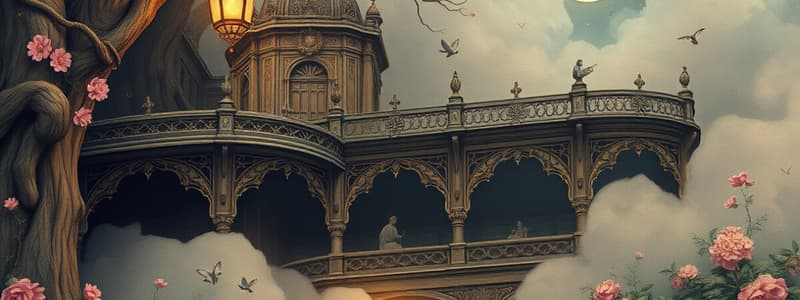Podcast
Questions and Answers
What is the genre of literature that includes fiction, drama, and poetry?
What is the genre of literature that includes fiction, drama, and poetry?
- Fantasy
- Romance
- Genre (correct)
- Non-fiction
What is a theme in literature?
What is a theme in literature?
Central or dominant idea made concrete by details in the work.
What defines a conventional theme?
What defines a conventional theme?
A theme that has occurred frequently over the years.
What does the literary canon refer to?
What does the literary canon refer to?
What is a plot?
What is a plot?
Who is defined as the protagonist?
Who is defined as the protagonist?
What is the role of an antagonist?
What is the role of an antagonist?
What is exposition in a plot?
What is exposition in a plot?
What does a crisis represent in a story?
What does a crisis represent in a story?
What is climax in literature?
What is climax in literature?
What happens during the resolution/denouement?
What happens during the resolution/denouement?
What does 'deus ex machina' refer to?
What does 'deus ex machina' refer to?
What does 'in medias res' mean?
What does 'in medias res' mean?
What is a flashback?
What is a flashback?
What does foreshadowing mean?
What does foreshadowing mean?
What is a character in literature?
What is a character in literature?
What defines a round character?
What defines a round character?
What is a flat character?
What is a flat character?
What is a foil in literature?
What is a foil in literature?
What is a stock character?
What is a stock character?
What is a caricature?
What is a caricature?
What defines a dynamic character?
What defines a dynamic character?
What is a static character?
What is a static character?
What is motivation in literature?
What is motivation in literature?
What does setting refer to?
What does setting refer to?
What is atmosphere in literature?
What is atmosphere in literature?
What does mood refer to in a literary work?
What does mood refer to in a literary work?
What is point of view?
What is point of view?
Who is the narrator?
Who is the narrator?
What does persona mean in literature?
What does persona mean in literature?
What is irony?
What is irony?
Study Notes
Literary Terms and Concepts
- Genre: A category of literature that includes fiction, drama, and poetry, with subgenres such as novels, farces, and lyric poems.
- Theme: The central or dominant idea within a literary work, articulated through its details and emphasis.
- Conventional Theme: Recurring themes throughout literature, such as the loss of innocence.
- Literary Canon: A collection of significant literary works recognized by critics and teachers, with ongoing efforts to diversify it by including works from women and writers of color.
Plot Structure
- Plot: The arrangement of events in a story, featuring primary plots and subplots; typically follows a rising action, climax, and resolution.
- Exposition: The initial stage of a plot that introduces characters and setting, essential for understanding the story.
- Crisis: The peak of action in a story, leading towards the climax.
- Climax: The moment of highest tension or importance in a narrative where crucial action occurs.
- Resolution/Denouement: The final stage of the plot where the story concludes and loose ends are resolved.
Literary Devices
- Deus Ex Machina: An improbable plot resolution involving an external force or agent.
- In Medias Res: A narrative technique that starts the story in the midst of action to capture interest.
- Flashback: A storytelling method that revisits events from the past interrupting the current narrative timeline.
- Foreshadowing: Early presentation of elements that appear insignificant but gain meaning later in the story.
Characterization
- Character: A fictional representation of a person, not always realistic.
- Round Character: A well-developed character that is deeply involved in the story's action.
- Flat Character: A static and stereotypical character lacking depth.
- Foil: A minor character that contrasts with a main character, highlighting specific traits.
- Stock Character: A recognizable and consistently behaving character type.
- Caricature: An exaggerated stock character defined by a dominant trait.
- Dynamic Character: A character that undergoes significant growth or change during the story.
- Static Character: A character that does not change throughout the narrative.
Setting and Atmosphere
- Setting: The backdrop of a story, including historical time, place, season, time of day, and weather.
- Atmosphere: The tone or emotional aura of a literary work, often influenced by setting and language.
- Mood: The overall emotional environment created by various elements including setting, characterization, and tone.
Narrative Techniques
- Point of View: The perspective from which a story is told, including first-person or third-person narration, with variations in knowledge (omniscient or limited).
- Narrator: The individual responsible for telling the story.
- Persona: The narrator created by the writer, akin to a mask in Greek tragedy.
Irony
- Irony: A literary device that introduces contrasting meanings or experiences. It includes:
- Dramatic Irony: When the audience knows more than the protagonist.
- Situational Irony: When the actual outcome differs from what was expected.
- Verbal Irony: When spoken words contrast with their intended meaning.
Studying That Suits You
Use AI to generate personalized quizzes and flashcards to suit your learning preferences.
Description
Test your knowledge of literary terms with these flashcards. This quiz covers essential concepts such as genre and theme, providing definitions and explanations for better understanding. Ideal for anyone studying literature, whether in class or independently.




